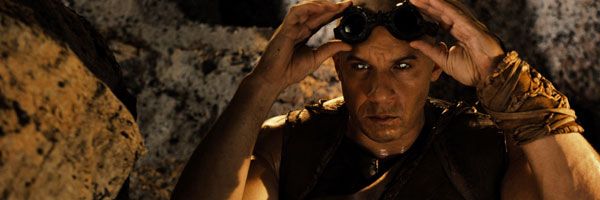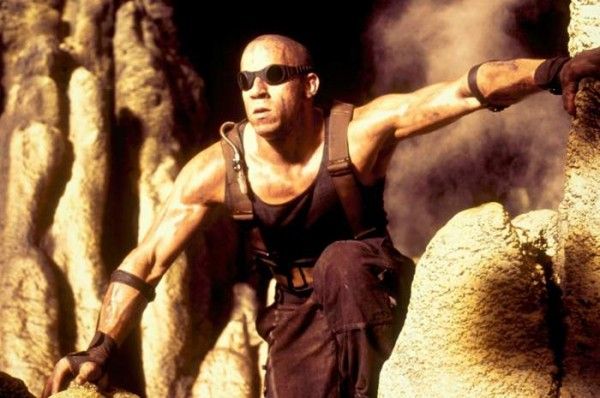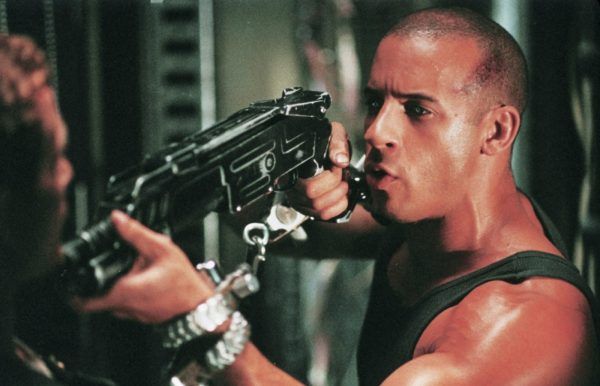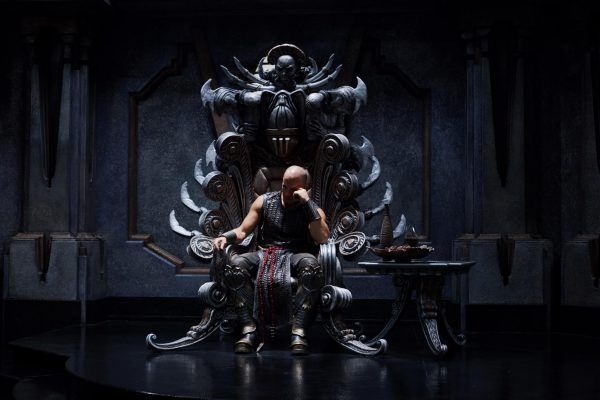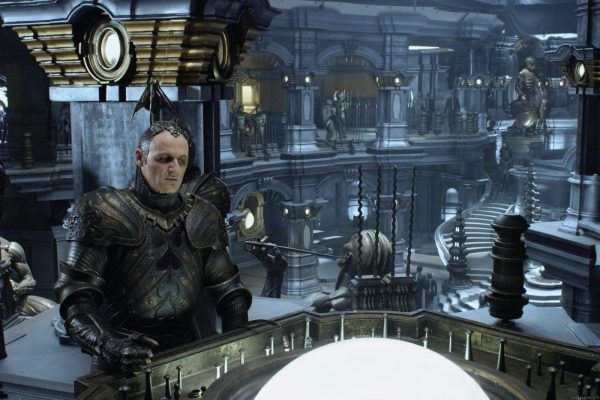The filmography of Vin Diesel is a treasure trove of boundless joy (yes, even Find Me Guilty, in which his hairpiece gives an Oscar-worthy performance). And the man has several massive successes under his belt, including two billion-dollar franchises in Fast & Furious and Guardians of the Galaxy. He’s also had a few less-than-successful attempts at franchise starters, such as Babylon A.D. and The Last Witch Hunter (god willing, we will get three more Last Witch Hunter movies, because that movie rules). And right there in the middle is the Riddick series. Starting with the surprise hit Pitch Black, Vin and director David Twohy spun the character of intergalactic outlaw Richard B. Riddick off into a big-budget sequel, 2004’s The Chronicles of Riddick. A box office disappointment that is frequently used as a punchline to describe the worst aspects of movie star hubris, Chronicles was nonetheless followed up with a third installment, 2013’s Riddick. Vin notably had to fund most of that film himself, including putting a mortgage on his house. And I’m so glad he did, because Riddick is legitimately a great series, and a franchise that deserves more credit than it gets.
The thing you have to understand about Vin Diesel is that every single thing he does is 100% in earnest. In addition, his interests are almost perfectly aligned with those of a 13-year-old boy. Consequently, every one of his movies is something a teenager would think is cool. However, Vin throws himself into each one with such enthusiastic commitment that it’s impossible not to enjoy them. Sure, his movies tend to be dumb, but they are also some of the purest experiences you can have watching a movie. Vin believes in everything he does, and goddammit, an invincible bald mercenary with night vision powers getting into space fights with gothed-out skeleton warriors is both stupid and cool. You can eat popcorn to that shit.
Also, comparatively speaking, the Riddick series isn’t that juvenile. It’s Vin’s most mature franchise – it’s dark and unforgiving, and there are no heroes, at least not traditional ones. Sure, Riddick does engage in the kind of action figure bodacity you’d expect to see in XxX or Fast & Furious, but he never snowboards off of a cliff or hangs out with Tony Hawk. (Although he does do an aerial grab in Riddick while jumping his space motorcycle over a lagoon of scorpion parrots.) He exists in a bleak, punishing universe, and while his Chronicles are entertaining, I hesitate to describe them as “fun,” at least not in the ways that The Last Witch Hunter or Bloodshot are fun. Unlike pretty much every other Vin Diesel franchise, there are actually consequences in Riddick’s world, and he doesn’t always do the right thing. However, Pitch Black does make liberal use of the fisheye lens, and I would like them to apologize for that at some point.
There’s something to be said about a grimy R-rated sci-fi franchise for adults. We haven’t had one since Alien, and those movies have been sucking for the past thirty years. And while in some ways Riddick is an “adult” franchise in terms of its rating only, the fact that it frequently embraces a juvenile vision of “cool” in the middle of one of the bleakest settings of any blockbuster franchise is part of its appeal for me. The Riddick films have all of the goofily captivating mythology of Star Wars or Firefly, but everything is hard-edged and unkind. It’s modern pulp science fiction with a nastiness Hollywood typically does everything in its power to scrub away from its blockbusters. My appreciation and enjoyment of the Riddick franchise has only grown over the past decade, after being inundated with superhero movies and Star Wars films that all look exactly the same and take zero interesting chances for fear of jeopardizing their billion-dollar grosses. Say what you will about Riddick, but it’s obvious Vin Diesel and David Twohy are vastly more concerned with crafting their universe the way they want to than they are with actually making any money.
Pitch Black, which arguably anyone would agree is the best film in the series, genuinely has a good hook in that we don’t know what to make of Riddick. He remains primarily an antagonist until almost the very end of the movie. He spends the first hour or so galloping around the desert planet like the biggest kid at McDonald’s PlayPlace forcing a game of tag that nobody else agreed to. He does weird shit like sneak up behind Fry (Radha Mitchell) and cut off a lock of her hair, then sniffs it and blows it away like a handful of rose petals. This is not an intimidation tactic, because nobody else can see him in this scene except for us. Nope, that hair sniff is entirely for Riddick. I have no idea what we’re supposed to do with this information, but it’s 100% something Disney would never let Han Solo do, and I appreciate that. I like that Riddick remains a shifty weirdo with whom we’re never totally comfortable. Which leads into one of my main points – Riddick Is a Good Character, Actually™.
Seriously, Riddick is interesting! Typically, when movies set out to make an antihero protagonist, they chicken out in order to make the character more likeable and less of a villain. But Riddick is a glistening bastard 24/7. He’s a nihilist completely motivated by self-interest, with an animalistic devotion to his own survival at the expense of anything (or anyone) else. He regularly threatens to kill Iman (Keith David), the closest thing he has to friend in the entire stellarverse, and the second movie ends with him being crowned an evil space emperor. The only reasons we stay on Riddick’s side are 1) he’s super cool, and 2) the rest of the universe is populated entirely by shitheads. Also, every woman he comes into contact with wants to fuck him (see “juvenile,” above). I don’t know what that means other than “these movies were produced by Vin Diesel,” but it’s a character trait that cannot be ignored.
In The Chronicles of Riddick, the titular character is literally tasked with saving the universe and he could not be less interested. And not in a reluctant hero sort of way, where he’s like, “I never asked for any of this! I just want to live my life!” Riddick simply doesn’t give a shit and is totally content to let the Necromongers conquer the universe just to see what happens. Even when they show up and take over Helion Prime, killing thousands in the process, he is not moved to care in the slightest. He interrupts the Necromonger celebration (which is being held in the SpaceFuture equivalent of the Greek Theater) just to stab the everlasting jesus out of the guy who killed Iman. Then he turns around and tries to leave. He literally attempts to walk out of the movie.
The only reason the rest of the movie happens is because the Necromongers decide to take him onboard their horror vessel to get their weird psychics to try and figure out who he is. Riddick gets invested after that point when he learns that the Necromongers destroyed his home planet Furya, and after they kidnap his sort-of surrogate daughter Jack/Kira (Alexa Davalos). I dump this much of The Chronicles of Riddick’s Shakespearian plot on you to illustrate the fact that Riddick only gets involved when someone slights him personally. He’s never motivated by the greater good, or what is morally correct – his guiding light is whatever is best for Riddick in that particular moment and/or whatever is currently pissing him off.
The production design in the Riddick trilogy is great in all of the ways that it doesn’t look like Star Wars. Planets are harsh and ugly, and populated by mindlessly aggressive wildlife that sustains itself entirely on murder. Rather than thinly-veiled Nazis dressed in smooth, shiny armor, the chief villains in the Riddick universe are a death cult dressed like violent skeletons and siphoning energy from another dimension. The technology of the Necromongers is deeply unsettling - instead of radios, they use barely-living corpses in plastic bags to transmit messages through the realm of the dead, and in order to join their ranks you have to dangle in a body suspension parlor with tiny swords in your neck until you become part ghost. Their entire aesthetic is “H.R. Giger throwing a Halloween party at NASA,” but in none of the ways that would make that a fun experience. The Necromonger society is grotesque and repellent in a very primal way that is infinitely more interesting than what I’ve seen in any other sci-fi setting (except for maybe the Borg, but I personally feel the Necromongers are creepier). Riddick deserves praise for developing a dark, grim world that stands out among Star Wars and Star Trek clones that generally chase the same “space is a fun adventure” vibe with a bunch of cool ships and futuristic technology. Space fucking sucks in the Riddick universe. Nobody shouts “yippee” here.
I’m not saying all this to rag on Star Wars, or Marvel, or your Jurassics World. I’m merely using them as touchstones to point out all of the things that make Riddick unique in a galaxy of big-budget action adventure franchises that are becoming increasingly bland. Riddick is corny and childish in some ways, but it’s also the result of uncompromised artistic vision – a dark, horrific space opera starring a compelling antihero who actually remains an antihero. Plus he can see in the dark, and that’s just cool, man.
Tom Reimann is an Associate Editor at Collider currently trying to get thrown in a slam where he can trade 20 menthol Kools to get a shine job on his eyeballs. You can follow him on Twitter @startthemachine.

